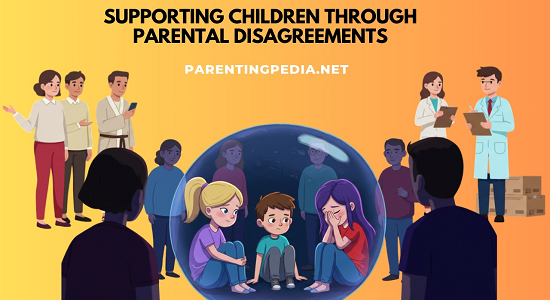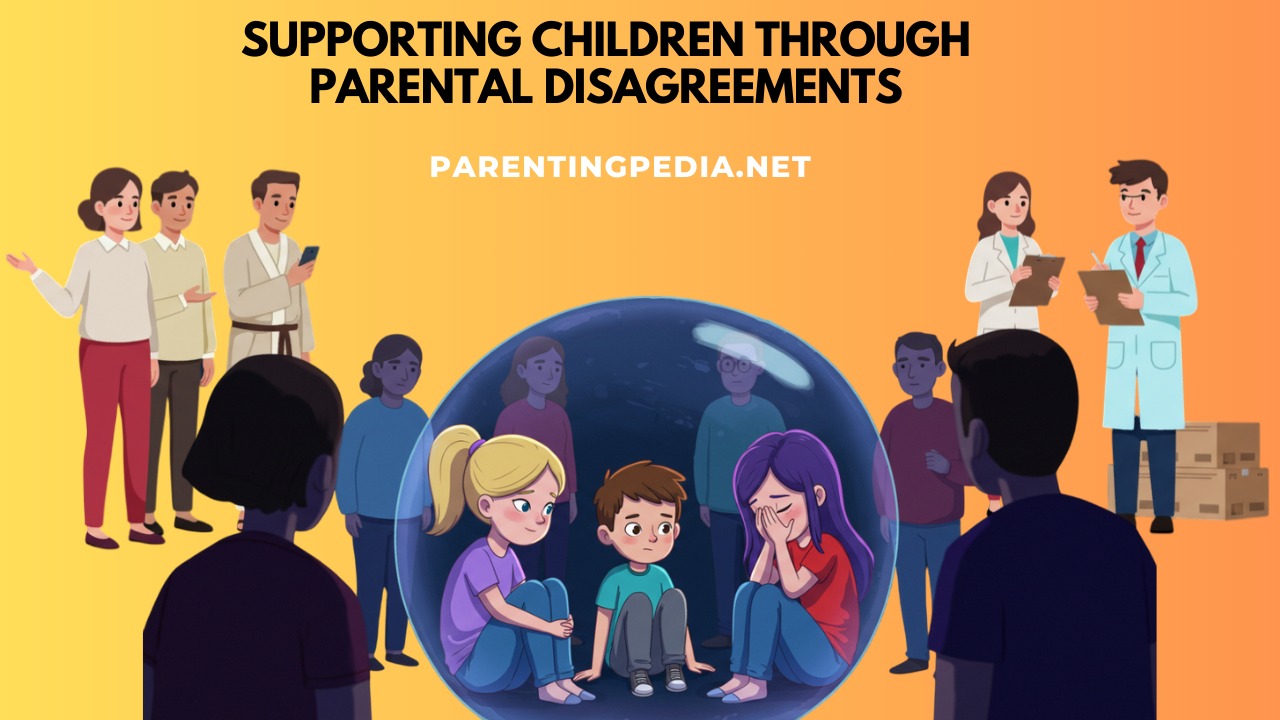Parental disagreements are a natural part of relationships. No two people can agree on everything, and conflicts arise from differences in opinions, parenting styles or financial concerns etc. While disagreements between parents are common, how they are handled can significantly impact children. When managed poorly, parental conflicts can cause emotional distress, anxiety, and confusion in children. However, when disagreements are addressed with respect and understanding, they can teach children valuable lessons about communication, problem-solving and emotional regulation. This article explores how parental disagreements affect children and provides practical strategies to support them through conflict while promoting a healthy and stable environment at home.
Understanding The Impact Of Parental Disagreements On Children
Children are highly sensitive to their parents’ emotions and interactions. Even when parents believe they are arguing privately, children can sense tension and disharmony. The way parents handle disagreements can determine whether the impact on children is negative or neutral.
Negative Effects Of Poorly Managed Parental Conflicts
Emotional Distress
- Children may feel scared, anxious, or insecure when they witness frequent arguments.
- Exposure to hostility can lead to feelings of helplessness or fear of family instability in children.
Behavioral Issues
- Children may mimic aggressive or argumentative behavior, believing it is a normal way to resolve conflicts.
- They may become withdrawn, avoid interactions, or develop defiant behavior as a coping mechanism.
Academic and Social Struggles
- Stress from witnessing parental conflicts can make it difficult for children to concentrate in school.
- Unresolved emotions may affect their friendships and ability to trust others.
Low Self-Esteem
- Children may internalize blame for their parents arguments, believing they are the cause of the conflict.
- Continuous exposure to negativity can damage their confidence and sense of self-worth.
Future Relationship Challenges
- If children grow up seeing unresolved conflicts, they may struggle to develop healthy communication skills in their own relationships.
- They may fear commitment or experience difficulty expressing emotions openly.
Neutral Or Positive Effects Of Healthy Conflict Resolution
When parents handle disagreements with respect and open communication, children can learn valuable life skills, including:
- Emotional Regulation – Children can learn that emotions are normal and can be managed constructively.
- Conflict Resolution – While observing parental disagreements, children learn that disagreements can be resolved through discussion rather than anger.
- Respect and Empathy – Children observe how people can disagree while still valuing and respecting one another.
By modeling healthy conflict resolution, parents teach their children skills like resilience, problem-solving and emotional intelligence that will benefit them throughout their lives.

How To Support Children During Parental Disagreements
Keep Disagreements Respectful and Constructive
Disagreements should be handled with respect, without yelling, name-calling or personal attacks. Keeping a calm tone and focusing on finding a solution rather than proving a point helps create a safer emotional environment for children. Simple tips can help in keeping parental disagreements respectful and constructive such as:
- Avoid fighting in front of children when possible.
- If disagreements do occur in their presence, demonstrate respectful communication.
- Use “I” statements instead of blaming other person like “I feel frustrated when…” instead of using “You never…”.
2. Reassure Children That They Are Not to Blame
Children often assume that parental conflicts are their fault, even when the argument has nothing to do with them. Parents must reassure their children that disagreements are a normal part of relationships and not caused by them.
- Use simple explanations to explain to children like “Mom and Dad sometimes disagree, but that is okay. We still love you, and everything will be fine.”
- Avoid making children take sides of parents or feel responsible for fixing the situation.
3. Maintain Stability and Routine
A predictable routine helps children feel secure, even when tensions arise between parents. Stability gives them a sense of normalcy and control over their environment even if there are parental disagreements:
- Stick to daily routines like meal times, bedtime, and school schedules.
- Engage in positive family activities to reinforce a sense of unity in children, such as playing games or reading together.
4. Encourage Open Communication
Children should feel comfortable expressing their emotions and concerns about parental disagreements. Encouraging them to talk about their feelings without fear of judgment helps them process emotions in a healthy way. Simple tips can help in encouraging open communication even during phase of parental disagreements such as:
- Ask open-ended questions: “How are you feeling today?”
- Validate their emotions: “I understand that you feel sad when Mom and Dad argue. That is okay.”
- Avoid dismissing their concerns with phrases like “It’s nothing” or “You wouldn’t understand.”
Also Read: Finding Joy In Parenting Despite Challenges
5. Model Healthy Conflict Resolution
Children learn how to handle disagreements by watching their parents. Demonstrating calm communication, active listening, and compromise teaches them valuable problem-solving skills.
- Show that it’s okay to disagree and still respect each other.
- Apologize when necessary and highlight the importance of taking responsibility for actions.
- Resolve conflicts in a way that allows children to see the outcome, reinforcing the idea that arguments can have peaceful resolutions.
6. Avoid Involving Children in the Conflict
Parents should never put children in the middle of parental disagreements. Asking children to choose sides or act as messengers can create emotional distress and feelings of guilt. Following simple techniques such as avoiding speaking negatively about other parent in front of the child or refraining from using children as intermediaries to communicate messages can help avoid involving children during parental disagreements.
7. Provide Emotional Support
Children may not always express their feelings openly, but they still experience stress from parental disagreements. Being emotionally available and supportive helps them navigate these feelings. Provide emotional support to children by following simple tips such as:
- Offer hugs, reassurance, and quality time together.
- Encourage them to engage in activities that bring them joy and relaxation.
- If a child seems particularly distressed, consider seeking guidance from a counselor or therapist.
8. Resolve Conflicts When Possible
While some parental disagreements may take time to resolve, consistently working toward solutions rather than prolonging conflicts helps maintain a healthier home environment. Follow tips such as:
- Address conflicts privately and avoid prolonged silent treatment or hostility in front of children.
- If disagreements persist, consider seeking professional counseling to improve communication.
What to Do After An Argument in Front of a Child
If an argument happens in front of a child, it is important to address it afterward to help them process their emotions:
- Acknowledge What Happened – Let them know it is okay to feel upset, but assure them that disagreements do not change the love within the family.
- Explain in Simple Terms – Without giving unnecessary details, say something like, “Mom and Dad had a disagreement, but we are working through it.”
- Reassure Their Safety – Remind them that they are loved and safe, and that disagreements do not mean the family is breaking apart.
- Demonstrate Resolution – If possible, let them see that you and your partner have worked things out peacefully.
For more helpful parenting tips, visit-loveyoumommy
Conclusion
Parental disagreements are a natural part of relationships, but how they are managed determines their impact on children. By handling conflicts with respect, reassuring children of their security, and promoting open communication, parents can create a nurturing environment even during challenging times. Supporting children through parental disagreements requires patience, understanding, and a commitment to maintaining a stable, loving home. With mindful efforts, parents can not only protect their children from the negative effects of conflict but also teach them valuable lessons in emotional resilience and healthy communication.
FAQ
How do you handle disagreements in parenting?
Disagreements in parenting can be handled by communicating openly, listening actively, and respecting each other views. Focus on problem-solving, compromise and keeping discussions calm. Avoid arguing in front of children and present a united front. Prioritize your child’s well-being over personal differences and seek professional guidance if conflicts become persistent or stressful.
How do you stop parental conflict?
Stop parental conflict by prioritizing respectful communication, active listening, and compromise. Focus on problem solving instead of blame and address issues calmly. Avoid arguing in front of children, take breaks when needed, and seek professional help if conflicts persist. Strengthen your partnership through mutual understanding, patience, and shared parenting goals.
Remember, the greatest reward of parenting lies in watching
your children soar with love and confidence.
Till then keep smiling and be happy

